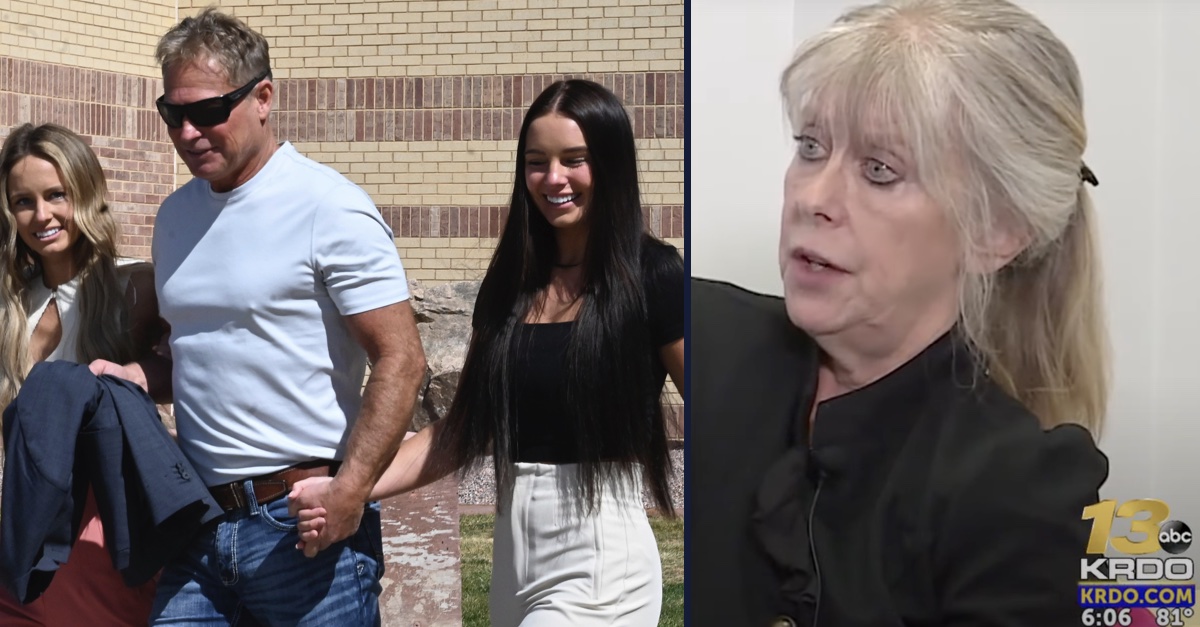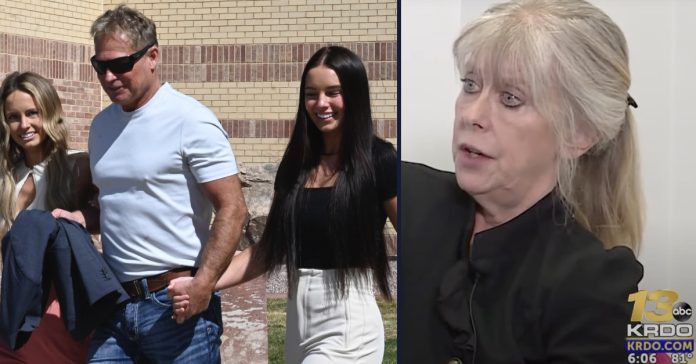
Barry Morphew (left) leaves a Fremont County court building in Canon City, Colo., with his daughters after charges against him in the presumed death of his wife were dismissed, Tuesday, April 19, 2022. (Jerilee Bennett/The Gazette via AP, File)/The Gazette via AP), (right) DA Linda Stanley pictured during an interview about a separate case mentioned in the complaint against her. (KRDO/screengrab)
The district attorney who brought and then dropped a murder case against Barry Morphew in the Mother’s Day 2020 disappearance and death of his wife Suzanne Morphew asked her chief investigator to dig up dirt on the divorce of a judge who presided over the failed case, an explosive complaint filed by the Colorado Supreme Court’s independent attorney regulatory body alleged.
The complaint filed Monday against 11th Judicial District Attorney Linda Stanley, who handles cases in Chaffee County, Custer County, Fremont County, and Park County, listed seven total claims that the DA violated the Colorado Rules of Professional Conduct — the first five of which relate to the Morphew case.
The identified rules — “A Lawyer Shall Act with Reasonable Diligence and Promptness — Colo. RPC 1.3,” “Pretrial Publicity — Colo. RPC 3.6(a),” “Prosecutor’s Extrajudicial Comments — Colo. RPC 3.8(f),” “Responsibilities of Supervisory Lawyer — Colo. RPC 5.1(a) and (b),” and “Attempt to Violate the Rules of Professional Conduct and Conduct Prejudicial to the Administration of Justice — Colo. RPC 8.4(a) and Colo. RPC 8.4(d)” — collectively painted a picture of Stanley botching the Morphew prosecution by withholding exculpatory evidence, impermissibly talking about the case on the YouTube channel “Profiling Evil” and in Facebook messages with Julez Wolf of “True Crime with Julez,” and by failing to make sure that the prosecutors under her supervision themselves abided by the Rules of Professional Conduct.
“Even after Respondent was on notice her prosecution team had been sanctioned for discovery violations, Respondent failed to verify that designated experts had been interviewed as to the scope of their opinion prior to being disclosed, failed to verify expert disclosures had been reviewed before filing, failed to verify that all material in support of the expert disclosures had been disclosed, and failed to ensure that all such disclosures were timely, and thus did not make reasonable efforts to ensure prosecutors in the Morphew case were complying with the Rules of Professional Conduct,” the complaint said.
But claim V was the most eye-popping of all, as it alleged that DA Stanley “instructed” her chief investigator Andrew Corey to “interview” the ex-wife of 11th Judicial District Court Judge Ramsey Lama to “uncover information” about his divorce that might lead the presiding judge to recuse himself or other be disqualified from the Morphew case — “despite having had no credible source for suspecting that Judge Lama had physically abused his ex-wife, or other conduct that would justify a criminal investigation.”
From the complaint:
139. Respondent persisted in having her own investigator interview the Judge Lama’s ex-wife, even after Commander [Alex] Walker refused to interview Judge Lama’s ex-wife due to a lack of credible evidence to warrant an interview.
140. Respondent used her position and office’s resources in a manner intended to prevent others, including Judge Lama, from effectively performing their roles in the criminal justice system.
141. Respondent’s actions constituted of an abuse of her power as an elected district attorney and were contrary to a prosecutor’s responsibility to act as a minister of justice.
142. Through her actions, Respondent acted in a manner that constituted an attempt to prejudice the administration of justice, and also was prejudicial to the administration of justice.
Stanley allegedly texted other prosecutors “encouraging them to investigate whether Judge Lama ever abused his ex-wife,” the complaint continued:
Respondent decided to interview Iris Lama because,
…we couldn’t understand Judge Lama’s orders that were so egregious against us, and he’s normally not like that. And we were discussing what’s going on, and those two came together. And I said, let’s see if we can get somebody to interview her to see if there was something going on or if she suspects that he is trying to get back at her, essentially, in almost a passive-aggressive way by making this case impossible to prosecute… So we wanted to see if she would say anything to us about any of that or if these actions by the judge may be almost a passive-aggressive move at her.
As Law&Crime noted when covering a completely separate case in September, Stanley found herself in hot water for an August interview with KRDO, in which she made “very blunt” extrajudicial statements on camera about William Henry Jacobs and Brooke Crawford, a boyfriend and girlfriend who had not yet gone to trial for the alleged Motel 6 murder of a 10-month-old baby boy.
“Without the caring factor, without the love factor, the baby is a pain in the ass,” Stanley said during the interview, commenting on her view of the alleged motive.
“I’m going to be very blunt here. He has zero investment in this child. Zero. He’s watching that baby so he can get laid. That’s it. And have a place to sleep,” the DA also said of the boyfriend. “I’m sorry to be that blunt, but honest to God, that’s what’s going on.”
Those remarks were the subject of claims VI and VII in the complaint, citing a rule against making an extrajudicial statement that a lawyer “reasonably should know will be disseminated by means of public communication and will have a substantial likelihood of materially prejudicing an adjudicative proceeding in the matter,” and a rule barring prosecutors from making out-of-court comments that “Have a substantial likelihood of heightening public condemnation of the accused.”
“Even after she’d already suffered the consequences of her extrajudicial statements in the Morphew case, Respondent continued with more brazen statements,” the complaint said, noting the elected DA up for reelection in November 2024 “shall refrain” under the rule from opining on the local news about a “defendant’s guilt or innocence is inherently prejudicial.”
Many of the remarks are included verbatim in the complaint, and the interview in question remains online:
Beyond the professional conduct probe, Stanley was named as a defendant in May, along with numerous state and federal investigators, in Barry Morphew’s federal civil rights lawsuit. Morphew alleged his “name and reputation” were “irreparably” tarnished by a “conspiracy to violate his state and federal constitutional rights.”
Morphew separately called for Stanley to be disbarred in a complaint to the very attorney regulatory body now alleging multiple violations of the Colorado Rules of Professional Conduct.
In September, more than a year after Barry Morphew’s murder case was dismissed, investigators finally found Suzanne Morphew’s remains. No arrests or charges have followed, and that likely has to do with the yet-to-be-explained “unknown male DNA” that was found on “various items of the crime scene: the interior cushion of the bike helmet, Mrs. Morphew’s bike, the glovebox and back seat of Mrs. Morphew’s Range Rover.”
Before tossing the case, Judge Lama was particularly taken aback that this potentially exculpatory information was not disclosed to the Morphew defense for two months, even as the “unknown male DNA partially matched DNA found in three out-of-state unsolved sexual assault investigations: Tempe, Phoenix, and Chicago.”
The state went on to dismiss the case against Morphew, without prejudice, nine days before jury selection was set to begin.
Judge Lama resigned in July 2022, citing health and personal reasons.
Stanley has not yet commented on the complaint, but she will have a chance to formally respond to the Office of Attorney Regulation’s complaint.
“If the intake attorney assigned to the investigation determines that a response from the respondent attorney is required, the office will send the respondent attorney a formal letter requesting a response. The letter will describe the facts of the complaint and list the Colorado Rules of Professional Conduct implicated. Pursuant to C.R.C.P. 242.14(a)(3), the attorney has 21 days to respond to this letter,” according to the Colorado Supreme Court website.
Read the complaint obtained by Law&Crime here.
Have a tip we should know? [email protected]

